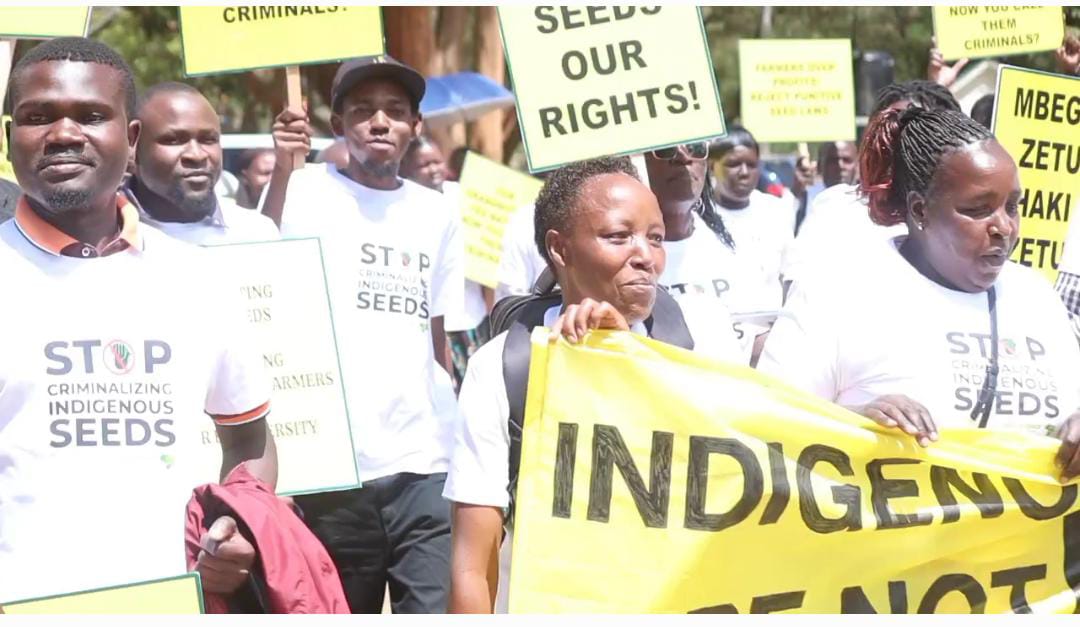
By Virginia Siebela
The High Court in Machakos has set November 27, 2025, as the date to deliver a landmark judgment on a petition challenging the constitutionality of Kenya’s Seed and Plant Varieties Act (Cap. 326) of 2012 and its accompanying Seeds and Plant Varieties (Seeds) Regulations of 2016.
Lady Justice Rhoda Ruto scheduled the ruling after concluding hearings from all legal representatives involved in the case.
The petition, filed on July 22, 2024, has drawn national attention, pitting smallholder farmers and civil society groups against the state over the future of indigenous seeds in Kenya.
The petitioners include farmers from 15 community groups, Greenpeace Africa, the Biodiversity and Biosafety Association of Kenya (BIBA), and the Law Society of Kenya (LSK), who are all raising alarm over what they see as a dangerous assault on traditional farming practices.
At the heart of the dispute is the claim that the Act criminalizes the use, sharing, and exchange of indigenous seeds, a practice deeply rooted in Kenya’s agricultural heritage. Farmers say this threatens not only their way of life but also the country’s food security.
Francis Ngiri, a farmer from Gilgil in Nakuru County, voiced frustration over the lengthy wait for judgment but said he remains hopeful. “This law criminalizes what our ancestors have always done. We trust the court will stand with us,” he said.
His sentiments were echoed by Peninah Wanjiku Ngao, who called farmers “the rightful custodians of indigenous seeds,” emphasizing that the law would rob them of this essential cultural role.
Justus Mwololo, chair of the Kenya Small-Scale Farmers Forum, said the submissions made by the petitioners were powerful and clear. “The law favors seed corporations and sidelines smallholder farmers. It’s unjust,” he said.
Daniel Wanjama of the Seed Savers Network went further, saying the state’s attempt to dismiss the petition as lacking merit ignores the grave risks. “Criminalizing indigenous seeds is a direct threat to food sovereignty and farmers’ rights,” he warned.
Lawyers representing the petitioners and Greenpeace Africa argued that traditional seed exchange is part of Kenya’s cultural fabric and must be protected under the Constitution. They called for the preservation of indigenous knowledge and farming freedom.
The Law Society of Kenya (LSK), appearing as an interested party, backed the petitioners. Their representative, Wambugu Wanjohi, lambasted the law’s harsh requirements. “Requiring farmers to pay KSh 75,000 to register their seeds and an annual fee of KSh 10,000 is outrageous,” he said, calling it discriminatory.
He added that the regulations give inspectors excessive powers to seize seeds from farmers’ homes, amounting to arbitrary property detention.
State lawyers, however, pushed back, accusing the petitioners of cherry-picking parts of the law to fit their narrative and ignoring broader protections.
But Leonida Odongo, a smallholder farmer from Siaya County, warned of the chilling effect the law could have. “Farmers will be afraid to plant their own seeds. This law will destroy our food systems,” she said.
Outside the Machakos High Court, dozens of farmers and supporters rallied in unity, hopeful that the court will rule in their favor and affirm their right to save, share, and plant indigenous seeds without fear of criminal prosecution.
The case is being watched closely across the region, as it could set a precedent for seed rights and smallholder protections across Africa.